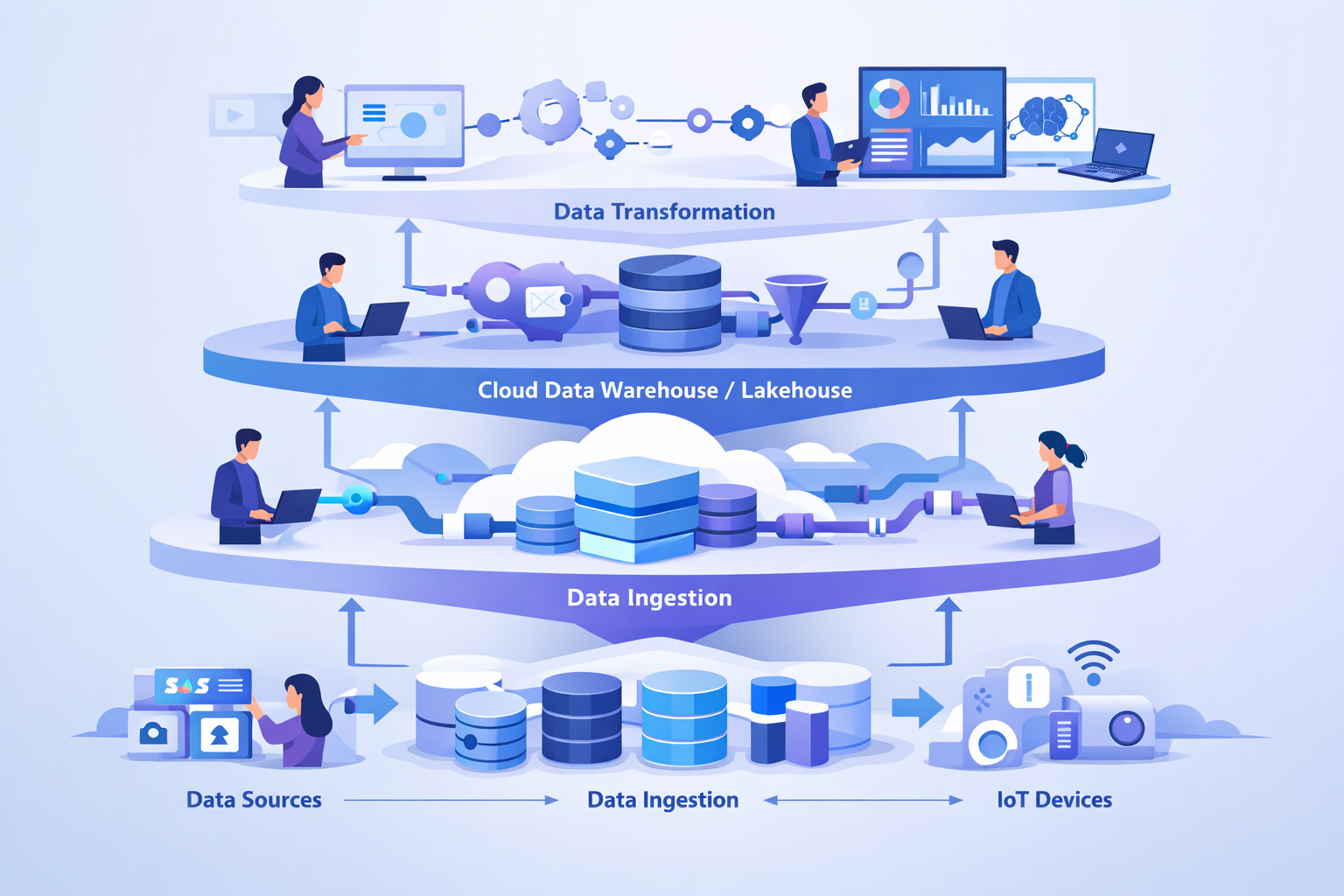The Modern Data Stack Explained Simply
Data engineering and data architecture are no longer back-office technical functions. They sit at the heart of how modern organizations generate insights, power analytics, and deploy machine learning at scale.
The modern data stack has emerged as a response to legacy data warehouses, brittle ETL pipelines, and siloed analytics tools. For data engineers, data architects, BI leaders, and C-level technology executives, understanding how modern data platforms work—and how data engineering fits into them—is now a strategic requirement.
This guide breaks down the modern data stack in simple, practical terms and explains how data engineering tools, architectures, and operating models come together.
The Modern Data Stack Explained
-
The modern data stack is a cloud-native, modular approach to data engineering and analytics.
-
Data engineering sits at the core, enabling reliable data ingestion, transformation, and modeling.
-
Modern data platforms prioritize scalability, flexibility, and analytics-ready data.
-
The right data engineering tools reduce operational complexity and accelerate business insights.

What Is the Modern Data Stack?
The modern data stack is a collection of cloud-based data engineering tools that work together to ingest, store, transform, and analyze data efficiently.
Unlike traditional monolithic systems, modern data platforms are:
-
Cloud-native
-
Loosely coupled
-
Best-of-breed
Core Layers of the Modern Data Stack
At a high level, the modern data stack includes:
-
Data Sources
-
SaaS tools (CRM, ERP, Marketing platforms)
-
Applications and product databases
-
IoT and event data
-
-
Data Ingestion
-
ELT-based pipelines
-
Batch and real-time ingestion
-
-
Cloud Data Warehouse or Lakehouse
-
Centralized analytics storage
-
Elastic compute and storage
-
-
Data Transformation
-
SQL-based modeling
-
Analytics engineering practices
-
-
BI, Analytics & ML
-
Dashboards, reports, and data science workflows
-
What is the difference between a traditional data stack and a modern data stack?
Traditional stacks rely on tightly coupled, on-prem systems, while modern data stacks use cloud-based, modular tools optimized for analytics and scalability.
How Data Engineering Fits into the Modern Data Stack
Data engineering is the connective tissue of modern data platforms.
A data engineer is responsible for:
-
Designing scalable data pipelines
-
Ensuring data quality and reliability
-
Optimizing performance and cost
-
Enabling analytics and machine learning teams
Without strong data engineering, even the best modern data stack will fail to deliver value.
Key Responsibilities of Data Engineers Today
Modern data engineers focus less on maintaining infrastructure and more on:
-
Building resilient ELT pipelines
-
Applying software engineering best practices
-
Collaborating with analytics engineers and data scientists
-
Supporting self-service analytics
This evolution has reshaped data architecture itself.
The Architecture Behind Modern Data Platforms
Modern data architecture emphasizes separation of concerns.
Key Architectural Principles
-
Decoupled storage and compute
-
ELT instead of ETL
-
Schema-on-read
-
Analytics-first modeling
These principles allow data engineering teams to scale without rewriting pipelines every time the business changes.
Is data engineering part of data architecture?
Yes. Data engineering implements data architecture by building and maintaining pipelines, models, and data platforms based on architectural design principles.
Modern Data Stack Tools Explained
Data Ingestion Tools
Modern data engineering tools prioritize reliability and ease of use:
-
Managed connectors for SaaS data
-
Change data capture (CDC)
-
Event-driven ingestion
Examples include Fivetran, Airbyte, and Kafka-based systems.
Cloud Data Warehouses & Lakehouses
These platforms form the foundation of modern data platforms:
-
Snowflake
-
BigQuery
-
Amazon Redshift
-
Databricks
They provide elastic scaling and support both BI and ML workloads.
Data Transformation & Analytics Engineering
Transformation has shifted closer to analytics:
-
SQL-based transformations
-
Version-controlled data models
-
Testing and documentation
Tools like dbt enable data engineers and analytics engineers to collaborate effectively.
What tools are part of the modern data stack?
Common modern data stack tools include ingestion platforms, cloud data warehouses, transformation tools like dbt, BI tools, and orchestration frameworks.
Why Organizations Are Moving to the Modern Data Stack
Business Benefits
-
Faster time to insight
-
Lower infrastructure overhead
-
Improved data reliability
-
Better collaboration across teams
Technical Benefits
-
Simplified data engineering workflows
-
Reduced pipeline brittleness
-
Easier scalability
For CIOs, CDOs, and CTOs, modern data platforms align technology investments with business agility.
Common Modern Data Stack Use Cases
Analytics & BI
-
Self-service dashboards
-
Operational reporting
-
KPI tracking
Data Science & Machine Learning
-
Feature engineering
-
Model training at scale
-
Real-time predictions
Product & Growth Analytics
-
User behavior analysis
-
Funnel optimization
-
Experimentation platforms
Can the modern data stack support real-time analytics?
Yes. With streaming ingestion and real-time processing layers, modern data stacks can support near real-time analytics and ML use cases.
Looking to modernize your data engineering architecture?
Talk to our data engineering experts to assess your current data platform and design a scalable modern data stack.
How to Choose the Right Modern Data Stack
Key Evaluation Criteria
-
Data volume and velocity
-
Analytics and ML requirements
-
Team skill sets
-
Cost and governance needs
Build vs Buy Considerations
Modern data engineering teams must balance:
-
Managed services vs custom pipelines
-
Vendor lock-in risks
-
Long-term scalability
There is no one-size-fits-all modern data stack.
The Future of Data Engineering & Modern Data Platforms
Trends shaping the future include:
-
Lakehouse architectures
-
Data observability and quality automation
-
AI-assisted data engineering
-
Metadata-driven pipelines
Data engineers will increasingly act as platform builders rather than pipeline maintainers.
Will the modern data stack replace traditional data warehouses?
In many organizations, yes. However, some legacy systems will coexist with modern data platforms for years.
Frequently Asked Questions
What is the modern data stack in simple terms?
The modern data stack is a cloud-based set of data engineering tools that ingest, store, transform, and analyze data efficiently.
How does data engineering differ from analytics engineering?
Data engineering focuses on pipelines and infrastructure, while analytics engineering focuses on transforming data for analytics and BI.
What skills does a modern data engineer need?
SQL, cloud platforms, data modeling, orchestration tools, and software engineering best practices.
Is the modern data stack only for large enterprises?
No. Startups and mid-sized companies often adopt modern data stacks earlier due to flexibility and lower upfront costs.
What are the best data engineering tools today?
Popular tools include Snowflake, BigQuery, dbt, Airbyte, Fivetran, and Databricks.
Ready to build a future-proof data platform?





